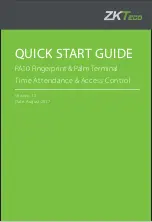
RTL8169
2002/03/27
Rev.1.21
48
Magic Packet Wakeup occurs only when the following conditions are met:
♦
The destination address of the received Magic Packet is acceptable to the RTL8169, such as broadcast, multicast, or
unicast address to the current RTL8169 adapter.
♦
The received Magic Packet does not contain a CRC error.
♦
The Magic bit (CONFIG3#5) is set to 1, the PMEn bit (CONFIG1#0) is set to 1, and the PME# can be asserted in current
power state.
♦
The Magic Packet pattern matches, i.e. 6 * FFh + MISC(can be none)+ 16 * DID(Destination ID) in any part of a valid
(Fast) Ethernet packet.
Wakeup Frame event occurs only when the following conditions are met:
♦
The destination address of the received Wakeup Frame is acceptable to the RTL8169, such as broadcast, multicast, or
unicast address to the current RTL8169 adapter.
♦
The received Wakeup Frame does not contain a CRC error.
♦
The PMEn bit (CONFIG1#0) is set to 1.
The
16-bit CRC*
(or
16-bit CRC
) of the received Wakeup Frame matches with the
16-bit CRC*
of the sample
Wakeup Frame pattern given by the local machine’s OS. Or, the RTL8169 is configured to allow direct packet wakeup,
such as broadcast, multicast, or unicast network packet.
16-bit CRC:
The RTL8169 supports 5 wakeup frames that includes 2 normal wakeup frames (covering 64 mask bytes from offset
0 to 63 of any incoming network packet) and 3 long wakeup frames (covering 128 mask bytes from offset 0 to 127 of
any incoming network packet).
The PME# signal is asserted only when the following conditions are met:
The PMEn bit (bit0, CONFIG1) is set to 1.
The PME_En bit (bit8, PMCSR) in PCI Configuration Space is set to 1.
The RTL8169 may assert PME# in current power state, or the RTL8169 is in isolation state, referring to
PME_Support(bit15-11) of the PMC register in PCI Configuration Space.
Magic Packet, LinkUp, or Wakeup Frame has occurred.
* Writing a 1 to the PME_Status (bit15) of PMCSR register in the PCI Configuration Space will clear this bit and cause
the RTL8169 to stop asserting a PME# (if enabled).
When the RTL8169 is in power down mode, ex. D1-D3, the IO, MEM, and Boot ROM spaces are all disabled, after a RST#
assertion, the RTL8169’s power state is restored to D0 automatically, if the original power state is D3
cold
. There is no hardware
delay at the RTL8169’s power state transition. When in ACPI mode, the RTL8169 does not support PME from D0 (This is
Realtek default setting of PMC register autoloaded from EEPROM. The setting may be changed from the EEPROM, if
required.).
The RTL8169 also supports the legacy LAN WAKE-UP function. The LWAKE pin is used to notify legacy motherboards to
execute the wake-up process whenever the RTL8169 receives a wakeup event, such as Magic Packet.
The LWAKE signal is asserted according the following setting.
LWPME bit (bit4, CONFIG4):
1: The LWAKE can only be asserted when the PMEB is asserted and the ISOLATEB is low.
0: The LWAKE is asserted whenever there is wakeup event occurs.
Bit1 of DELAY byte(offset 1Fh, EEPROM):
1: LWAKE signal is enabled
0: LWAKE signal is disabled.
















































